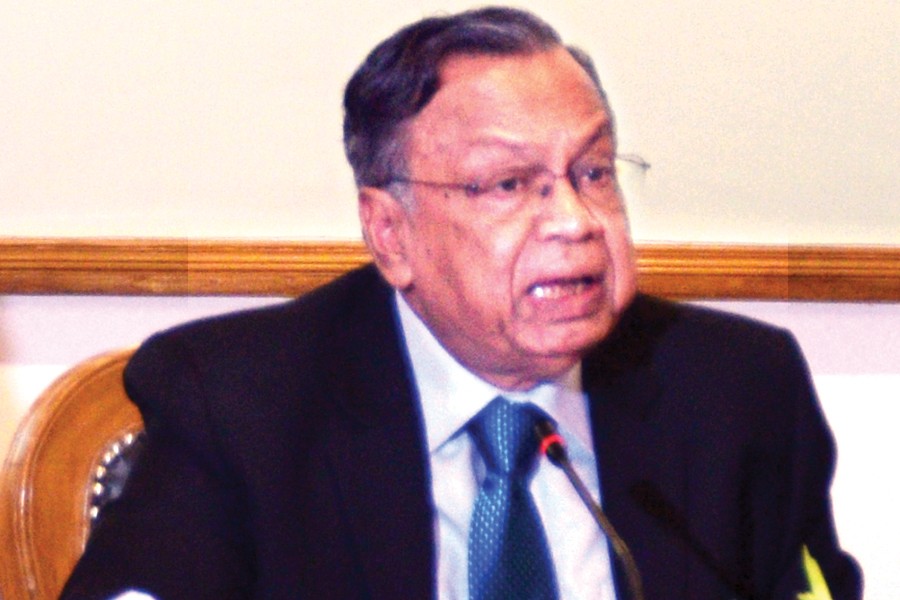Apparently disagreeing on the Myanmar proposal for taking back its exiled Rohingya minority people, Dhaka Tuesday observed that their citizenship and other human rights ought to be restored first to resolve the crisis.
"There are two aspects to resolve Rohingya issue. Firstly, Myanmar has to restore citizenship and other rights of Rohingya people. Secondly, the country has to abolish its discriminatory policies and put an end to its propaganda and religious hatred against Rohingyas," said Foreign Minister Abul Hassan Mahmood Ali.
He was speaking at a roundtable on 'The Rohingya Crisis: Measures Taken by Bangladesh and Way Forward', organised by Bangladesh Institute of International and Strategic Studies (BIISS) at its office in the city.
About Naypyidaw's proposal of following the principle and criteria of the 1992 deal to take back the forcibly displaced Myanmar nationals, the foreign minister said the 1992 criteria are not "realistic" and the 'situation in 1992 and current situation are entirely different".
He told the meet that about 3,000 Rohingya people had been killed in Rakhine since the attack on police outposts on August 25 while around 284 villages burnt down as well.
Urging complete and swift implementation of the Kofi Annan-led UN advisory commission recommendations, Mr Mahmood Ali said the recommendation can be helpful for long run to resolve key problems of the Rohingya crisis while more activities from global community are required for implementation of the recommendations.
He said, "Rohingya crisis is not alone Myanmar's internal issue rather it has become a regional problem. Besides, it's not a bilateral problem between Bangladesh and Myanmar."
Continued to page 7 Col. 6
Continued from page 1 col. 8
Bangladesh has no role in creating the crisis; the problem arises inside Myanmar so they have to resolve it as well, the foreign minister noted.
Mentioning that Bangladesh has been simultaneously discussing the issue with both international community and Myanmar, the FM said a EU foreign minister- level meeting will be held on October 16 in Brussels where they might take some actions against Myanmar Army officials.
Moderated by BIISS director-general AKM Abdur Rahman, the programme was also addressed by State Minister for Foreign Affairs Md Shahriar Alam, Foreign Secretary Md Shahidul Haque, Disaster Management and Relief Ministry joint secretary (refugee cell) Md Habibul Kabir Chowdhury with Chairman of the BIISS board of governors Munshi Faiz Ahmad in the chair.
Other discussants included former election commissioner and security expert Brig-General M Sakhawat Hussain, former foreign secretaries Shamsher Mobin Chowdhury and CM Shafi Sami, Refugee and Migratory Movements Research Unit (RMMRU) executive director Prof CR Abrar and Border Guard Bangladesh (BGB) director-general Major-General Abul Hossain.
Migration expert Mr Abrar said definition of Myanmar atrocity on Rohingya people is very important; it should be decided whether the act is ethnic cleansing or genocide.
There are no such laws defining ethnic cleansing, so defining the act on Rohingyas as ethnic cleansing will not have legal ground, he said. "…we should call it genocide to gain legal support from global community as clear signs of genocide were found in Rakhine."
He also said the government should take into account the verdict of international Permanent People's Tribunal as it found Myanmar government guilty of genocide against the Rohingya people.
Disaster Management and Relief Ministry official Mr Chowdhury said around 538,000 forcibly displaced Myanmar nationals have entered Bangladesh so far since the fresh influx started on August 25.
He said total number of Rohingya people living in different camps, both old and new, can cross 0.7 million but the actual number will be clear after registration.
The authorities with the help from armed forces have built 79,000 makeshift houses and another 150,000 houses will be built within next one month.
The government will also construct a 20-kilometre-long connecting road to Kutupalang camp for better transportation of relief and other goods.
A UNB report adds: Bangladesh proposed a joint verification instead of the unilateral one placed by Myanmar to determine the qualifications for repatriation of Rohingyas in a credible manner.
"We've proposed a joint verification against Myanmar's own verification proposal to determine qualification required for repatriation," Foreign Minister Mahmood Ali told a discussion.
He said Bangladesh also proposed international engagement and involvement of UN agencies like IOM and UNHCR at all stages of repatriation process.
Bangladesh laid emphasis on repatriation of all the Rohingyas who have taken shelter over here since the beginning of their exodus.
Earlier, Bangladesh and Myanmar agreed to form a joint working group to start the repatriation process the terms and reference of which will be set through discussions.
"The proposal to take back Rohingyas partially might be a Myanmar's strategy to lessen international concern and pressure on Myanmar," said the Foreign Minister.
He said Myanmar may downsize the number of valid Rohingyas for repatriation through its own verification process and delay the implementation of the Kofi Annan Commission's recommendations through various excuses.
"Repatriation is a complex and long-term process. It'll be difficult to convince Myanmar in long-term repatriation process without international monitoring and cooperation," Minister Ali said.
He said Bangladesh wants a peaceful solution to the crisis and it has been trying to resolve the issue through multilateral, regional and bilateral means. "We've international supports in our diplomatic efforts."
The Foreign Minister said Myanmar will have to address the root cause by way of returning Rohingyas' citizenship and basic rights. "It seems Myanmar won't take initiatives to resolve the root cause of Rohingya crisis if the international community doesn't put pressure on it," he said.


